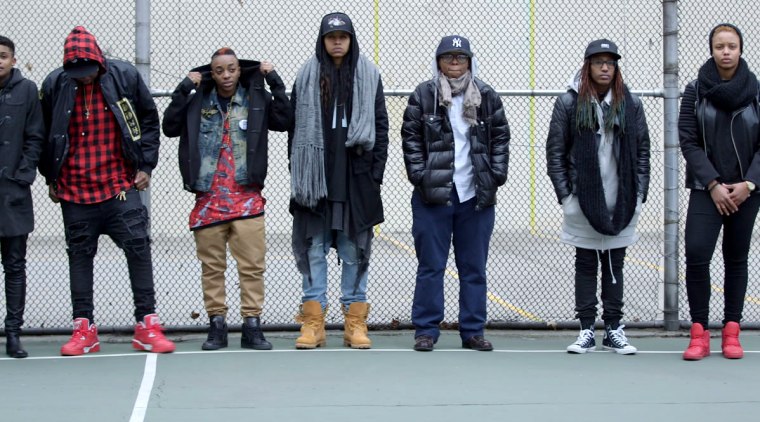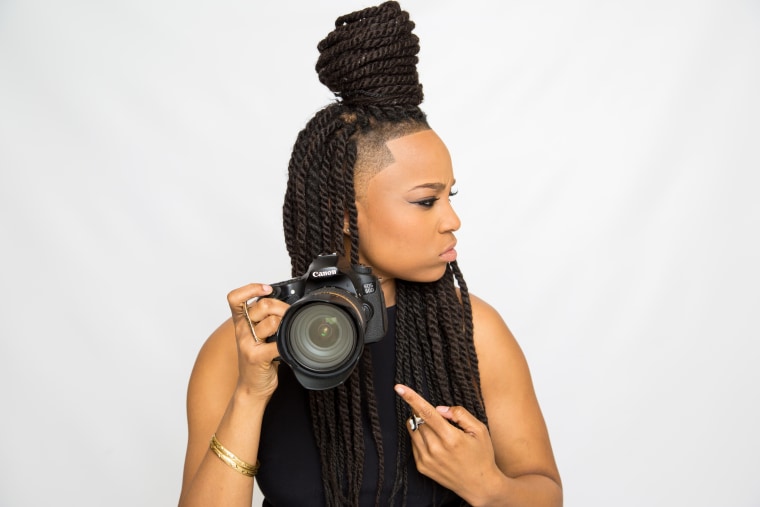When filmmaker Nneka Onuorah left the job she loved at BET last June, she said it was to pursue a higher purpose.
“I wasn’t producing anything for people who looked like me,” said Onuorah, a 27-year-old Queens, N.Y. native who is black and a lesbian. “I felt like I didn’t see myself represented in media, and I felt like our stories needed to be told.”
During her time at BET, Onuorah rapidly advanced from intern to producer. She was an associate producer for Black Girls Rock, an annual award show that honors and promotes women of color. After six years at BET, she began working independently on The Same Difference, a documentary that explores discrimination based on gender roles within the black lesbian community.
“I would go to work. Then afterward I would go and shoot interviews with friends that I met through the business and the industry, and I would shoot interviews of people in my community to start building this documentary,” she told NBC OUT. She soon left BET to work full-time on the project.

The Same Difference offers a glimpse into the world of black lesbians who identify as “aggressives” or “studs” (what many others might label "butch") and the harsh gender constraints thrust on them by their peers. From King Kellz, a stud mocked for her signature weave deemed too effeminate for an aggressive, to Jordan Diaz-Cross, an aggressive who endures a storm of criticism after becoming pregnant, Onuorah shows us how discrimination knows no bounds.
“Beyond the lesbian community, this message about being put in a box and being confined to what society wants to pin you down as, is a universal message ... it’s an important message to send to everyone,” Onuorah explains.
Onuorah is no stranger to discrimination herself. “When I was younger, I felt pressured to uphold this masculine presentation after I [came out as] a lesbian because I wasn’t the most girly girl, but I wasn’t also the most masculine woman...and when I chose to go a little bit on the feminine side, some people would have something to say,” she explained.
“A lot of places in media think our stories are irrelevant ... and that same struggle happens within LGBT media sources, [which] still question why black lesbian stories are important to tell. I think that is the most unsettling part of this."
Onuorah said the pressure for lesbians to conform to strict gender roles, especially in the black community, inspired her to make The Same Difference. She said the problem reflects broader issues surrounding gender norms within society.
“There’s this thing with femininity being weak as a common thread and that’s in heteronormative [mainstream] society as well,” she added.
Onuorah does not embrace labels herself. She’s known for her signature baseball caps that display her name in all caps, so people know to call her “Nneka” instead of “that girl with the braids or the lesbian girl,” she said.
Related: Filmmaker Explores Black Lesbian Identities in 'The Same Difference'
“I’m Nneka and whatever makes up who Nneka is, is beautiful. In every community, I’m Nneka. I don’t have to change, or wake up and say I identify as something else because I feel like putting on makeup today,” she explained.
Onuorah is inspired by a family of resilient women, especially her grandmother, a strong role model who helped raise her. The filmmaker and producer remains true to her roots and pushes for greater representation for black lesbians in media, though it hasn’t been easy, according to her.
“A lot of places in media think our stories are irrelevant ... and that same struggle happens within LGBT media sources, [which] still question why black lesbian stories are important to tell. I think that is the most unsettling part of this,” she said.
Onuorah is on a mission to “give a voice to the voiceless and make the invisible visible,” in her words. She is busy traveling to film festivals around the world and has screened her documentary in more than 50 cities. Her latest project, We Are All Women — a justice campaign and rally for black lesbians and bisexual women — will coincide with Atlanta Black Pride on September 4.
To say Onuorah is passionate about her work is an understatement.
“God put something inside me and will not allow me to stop. I think about it every morning. I think about changing the world every night before I go to sleep ... and that passion and that purpose, when you find [it], it just drives you."

